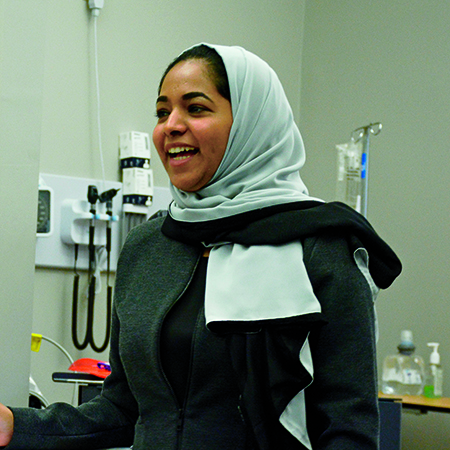Ibtisam Almashni ’18 and Seham Alselami ’18 traveled more than 6,000 miles from Saudi Arabia to earn a graduate degree in nursing at Regis. Though they arrived in the United States with vastly different cultural and religious experiences, their reason for choosing the nursing profession is very much the same as many American students: A personal medical experience shaped their decision.

Ibtisam Almashni ’18 presents an original simulation she designed for students
Photo by Sharon Wong
For Alselami, it happened during high school. “I was a caregiver for my father who is a diabetic patient, and my main source of inspiration to become a nurse comes from an innate desire to help people and care for them in times of need.”
Almashni was also in high school when she became interested in nursing, as she watched nurses deliver care. “My sister was sick at the time and her nurses were always so helpful and kind to her and to our family.”
By the time the pair arrived at Regis—along with five other graduate students from Saudi Arabia—they had earned a bachelor’s degree in nursing back home. But because their country did not offer advanced practice nursing education, the women came to Regis to prepare for the National Council Licensure Examination (NCLEX) and earn a graduate degree.
“At Regis, our goal is to ensure that our nursing colleagues globally have the same opportunities that we have in the United States,” says Patricia McCauley, DNP, CHSE, RN, associate professor and director of the Clinical Resource and Simulation Center at Regis. “We have a similarity in that we are all nurses, but we don’t all have the same access to educational resources.”
McCauley teamed up with the Center’s coordinator, Janis Tuxbury, DNP, RN, CNE, CHSE, to develop and teach the NCLEX course, which focused on test-taking strategies, language intricacies, and simulation exercises. All seven nursing students passed the exam the first time.
“The chances of a foreign-educated nurse passing the licensure exam on the first attempt is very low because of language and educational differences,” Tuxbury says. “The impressive 100 percent pass rate is a testament to how hard this group worked in the preparatory course. They went above and beyond.”
Since graduating from Regis in spring 2018, many women—including Alselami—went on to apply to doctoral programs; Almashni returned home to Saudi Arabia to teach at King Saud bin Abdulaziz University for Health Sciences College of Nursing. Their goal is to help advance the nursing profession in Saudi Arabia through education and advanced practice.
“At Regis I learned strategies for teaching, curriculum development, and presentation,” Almashni says. “I will apply these strategies with my own students.”
Embracing Diversity
Perhaps more meaningful than passing the NCLEX and earning a master’s degree is the fact that Almashni and Alselami felt safe in a new country as they studied. They both spoke of the principles that the university holds close to heart: respect, warmth, inclusion—welcoming all without distinction.
“There was an appreciation of diversity and differences in students’ backgrounds,” Alselami says.
The statement is simple, but its implications run deep. Students spent time learning about American culture, including Thanksgiving and Easter dinners at Tuxbury’s home and a graduation celebration hosted by McCauley. And they felt comfortable enough to reciprocate, sharing the food, traditions, and spirituality at the center of their lives.
The personal interactions were so powerful that students were assigned a project to develop presentations on health care in Saudi Arabia. “Caring Across Culture: Demystifying the Muslim Experience” was held in College Hall in April 2018 with topics including end-of-life care, childbirth, and the Islam diet. Almashni was also a keynote speaker at the Nursing Honor Society that same month. Her presentation—“Increasing Cultural Awareness in Nursing Students in Caring for Muslims Patients”—included the results of a simulation she developed for a diabetic patient who became ill when fasting for the Ramadan religious observance.
“Ibtisam addressed the important issue of nurses who need to deliver competent care while respecting religious practices,” McCauley says. It is common, for example, for Muslims to call for spiritual and religious intervention when facing a significant challenge.
“This wasn’t just about presenting posters, it was about the grace, commitment, and the grateful attitude of this cohort,” Tuxbury adds.
The success of the graduates is evidence of the changes that the nursing profession is experiencing in their home country: Nurses are gaining more respect and playing a role in the decision-making process of health care.
“Studying at Regis advanced my knowledge and allowed me to experience direct clinical practice, collaboration with a multidisciplinary team, research, and leadership opportunities to educate nurses, patients, and families,” Alselami says. “All of these positive things not only prepare me as a future advanced nurse practitioner, but they also empower me.”
Read more articles
Read the entire magazine online